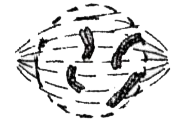Chromosome number of the parent is conserved in the daughter cells in
Equational division
Meiosis
Reduction division
Gametogenesis
To solve the question "Chromosome number of the parent is conserved in the daughter cells in which kind of division?", we can break it down step by step:
Step 1: Understand the Types of Cell Division
There are two main types of cell division: mitosis and meiosis.
Step 2: Analyze Mitosis
- In mitosis, a single parent cell divides to produce two daughter cells.
- The key feature of mitosis is that the chromosome number of the parent cell is conserved in the daughter cells. For example, if the parent cell has 46 chromosomes, each daughter cell will also have 46 chromosomes.
Step 3: Analyze Meiosis
- In meiosis, a parent cell undergoes two rounds of division.
- This results in four daughter cells, each with half the chromosome number of the parent cell. For instance, if the parent cell has 46 chromosomes, each daughter cell will have 23 chromosomes.
Step 4: Identify the Correct Answer
Since the question specifically asks about the conservation of chromosome number, the correct type of division is mitosis. This is also referred to as "Equational Division" because the daughter cells have the same number of chromosomes as the parent cell.
Conclusion
The chromosome number of the parent is conserved in the daughter cells during mitosis (Equational Division).
---
There are two main types of cell division: mitosis and meiosis.
- In mitosis, a single parent cell divides to produce two daughter cells.
- The key feature of mitosis is that the chromosome number of the parent cell is conserved in the daughter cells. For example, if the parent cell has 46 chromosomes, each daughter cell will also have 46 chromosomes.
- In meiosis, a parent cell undergoes two rounds of division.
- This results in four daughter cells, each with half the chromosome number of the parent cell. For instance, if the parent cell has 46 chromosomes, each daughter cell will have 23 chromosomes.
Since the question specifically asks about the conservation of chromosome number, the correct type of division is mitosis. This is also referred to as "Equational Division" because the daughter cells have the same number of chromosomes as the parent cell.
The chromosome number of the parent is conserved in the daughter cells during mitosis (Equational Division).
Topper's Solved these Questions
Similar Questions
Knowledge Check
After mitosis, the chromosome number of a daughter cell is the parent cell's
Adoubled compared toBone-halfCthe same asDrerranged compared to
Hypotheca of parent diatom forms in daughter
View SolutionComment on the statement - meiosis enables the conservation of specific chromosome number of each species even through the process per se results in reduction of chromosome number ?
View SolutionGiven below is a diagram representing a stage during mitotic cell division.
Study it carefully and answer the questions that follow:

How will you differentiate between mitosis and meiosis on the basis of the chromosome number in the daughter cells?
View SolutionSomatic chromosome number is 40. what shall be chromosome number in the cells of seminiferous tubule?
View SolutionWhen a cell undergoes meiosis, the number of chromosomes in daughter cells will be
View SolutionWhat will be the total number of mitotic divisions in the formation of 64 daughter cells ?
View SolutionChromosome number in endosperm cell of plant a and in the root apical meristem cell of plant b together equal to chromosome number in shoot apical meristem cell of apple. Plants a and b respectively are
View Solution
